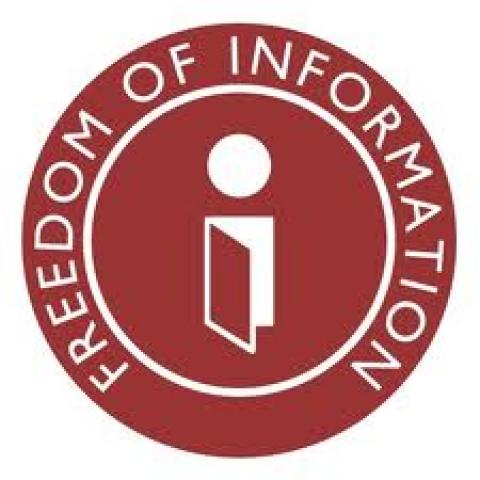 ONE: Nigerians now have the right and responsibility to demand public information from the government. President Jonathan signed the aged Freedom of Information (FOI) bill to law last week Saturday. The Freedom of Information Act protects whistleblowers from prosecution, guarantees the right to demand information and makes it a crime to destroy information that belongs to the people. It is a major triumph of our democracy and the first step in the right direction towards transparency and accountability. However, there is still a long way to go. There are major sections of the bill that did not make it into the act and they will have to be added with subsequent amendments as the Nigerian democracy matures. Moreover, the act is presently simply a federal law and it does not apply to the States. It is imperative that the States adopt the Act and pass it in the State Assemblies for smooth implementation across the board. The Nigerian FOI act is available HERE and HERE Specific information about the bill is also available HERE.
ONE: Nigerians now have the right and responsibility to demand public information from the government. President Jonathan signed the aged Freedom of Information (FOI) bill to law last week Saturday. The Freedom of Information Act protects whistleblowers from prosecution, guarantees the right to demand information and makes it a crime to destroy information that belongs to the people. It is a major triumph of our democracy and the first step in the right direction towards transparency and accountability. However, there is still a long way to go. There are major sections of the bill that did not make it into the act and they will have to be added with subsequent amendments as the Nigerian democracy matures. Moreover, the act is presently simply a federal law and it does not apply to the States. It is imperative that the States adopt the Act and pass it in the State Assemblies for smooth implementation across the board. The Nigerian FOI act is available HERE and HERE Specific information about the bill is also available HERE.
TWO: The President signed into law the Nigerian Health Bill last week. The ACT presents a comprehensive plan for building a fully functioning health system in Nigeria with clear roles and responsibilities for all the stakeholders in the sector. It proposes an increase in governmental spending for health, which presently is merely 6% of the GDP. It also guarantees proper primary health care for all Nigerians. While there is some disagreement between the Nigeria Medical Association (NMA) and other “Health workers association” about the preference given to the NMA in deciding the National health policy, the Act is a triumph for the civil society. Above all, it is a triumph for the women who stormed the seat of the lawmakers 2 weeks ago and for all Nigerians.
THREE: The Nigerian House of Representatives and the Nigerian Senate have adopted an harmonized bill to repeal the Money Laundering (Prohibition) Act 2004 and enact the Money Laundering (Prohibition) Act 2011 after both bodies passed slightly different versions of the proposed bill. The legislatures are also in the process of passing various bills including but not limited to the Geneva Conventions Act, the Public Service Delivery Office bill, a bill for the Establishment, Management and Operation of a Centre for Commercial Arbitration, a Bill for an Act to Establish the Nigerian Intelligence Agency Pensions Board and Bill to Establish the State Security Service Pensions Board.
FOUR: It is obvious that Boko Haram is getting increasingly comfortable with their strategy of terrorism. Boko Haram got the attention of the World in 2009 when the organization killed 700 people in one week. The shocking reign of terror ended with the capture of then leader of the sect, Mohammed Yusuf. He was later killed in detention. In April 2011, the organization was revived again and 3 people were killed. Recently, the sect has grown more brazen with its terrorism. They claimed responsibility for the twin bomb attacks in Bauchi state that killed more than 13 people last week. The bombs were detonated ostensibly to protest President Jonathan’s election and inauguration. Further, Boko Haram assassinated the brother of the Shehu of Borno last week. The Shehu of Borno is the spiritual leader of the northeast and he is second only to the Sultan of Sokoto. Late last week, the group burnt down a warehouse used to store vaccines for immunizing kids against polio, measles and meningitis owned by the Borno ministry of health. They have also threatened to blow up the University Hospital in Maiduguri. The repercussions of increased insecurity of the North are many and profound. Something has to be done ASAP.
FIVE: Four prominent governors of major states in Nigeria are missing. The EFCC had expressed the intent to arrest or call for questioning some governors who were accused of mismanaging public revenue and who were protected by the immunity clause while in office. The protective clause officially ran out since the recent elections when most of these governors lost their reelection bid. Among those who are missing are Gbenga Daniel (Ogun), Ikedi Ohakim (Imo), Adebayo Alao-Akala (Oyo), and Akwe Doma (Nassarawa). Gbenga Daniel and Akala currently have petitions against them at the EFCC and the organization has vowed to find them. The importance of the gubernatorial offices cannot be overstated. In a decentralized system, governors pay a huge role in economic development in Nigeria. They have access to huge resource, the mismanagement of which could further retard the progress of the Nigerian economy. Punishing those who were corrupt in office will serve as further deterrence against such. Perhaps it is also the right time to review the immunity clause.
SIX: The EFCC has arrested the former speaker of the House Dimeji Bankole on corruption charges. He is accused of illegally obtaining a N10 billion loan for the House of Representative. The former speaker claims that the loan was meant to pay for the enhanced allowances for members with the consent of the executives of the House. The EFCC attempted to arrest him last week to no avail and now he is in custody. Bankole’s tenure as speaker was filled with many corruption allegations including the car purchase fraud and others.
SEVEN: The policy to privatize the PHCN is underway. The plan is to break the electricity parastatal into various distribution and generating outfits in the private sector. Last week, 253 bids from prospective companies have been pre-qualified for the distribution firms, while 272 bids are for the generating companies. Some prominent companies already have pre-qualified bids and are set to go to the next step in the process. One hopes the same privatization policy that helped ushered in a new era in the communications industry would be replicated with electricity in Nigeria.
EIGHT: A successful raid of a hospital in Aba state by the Nigerian police force uncovered an illegal baby factory. Teenage girls between 15 and 17 years were being held against their will, impregnated and forced to have babies that are subsequently sold for rituals and illegal adoption. 35 pregnant girls and 4 babies were rescued and discharged from the custody of the trafficking ring reported the Abia state Police Commissioner Bala Hassan. The hospital owner apparently sells the babies for $6,400 while the mother is paid $170 for each pregnancy. The crime carries a sentence of 14 years in prison if convicted.
NINE: A Lagos company has launched a mobile service to help Lagosians navigate the stressful roads of Lagos. The service gives up-to-the-minute traffic status / information within the state using a crowd sourcing model to gather the traffic information in different areas. The service is still in its infancy and it is available on the web, on mobile phones and through SMS. More information available HERE.
TEN: Here is a brief interview with the prominent lawyer and humanitarian Toyin Saraki. She is the founder of “The Wellbeing Foundation”, a group working to reduce maternal mortality and boost child survival in Nigeria and beyond. She recently released a records book for pregnant women to be used in hospitals around the country to gather important demography data that can be used to improve maternal health. She is also the wife of the former governor of Kwara State.


